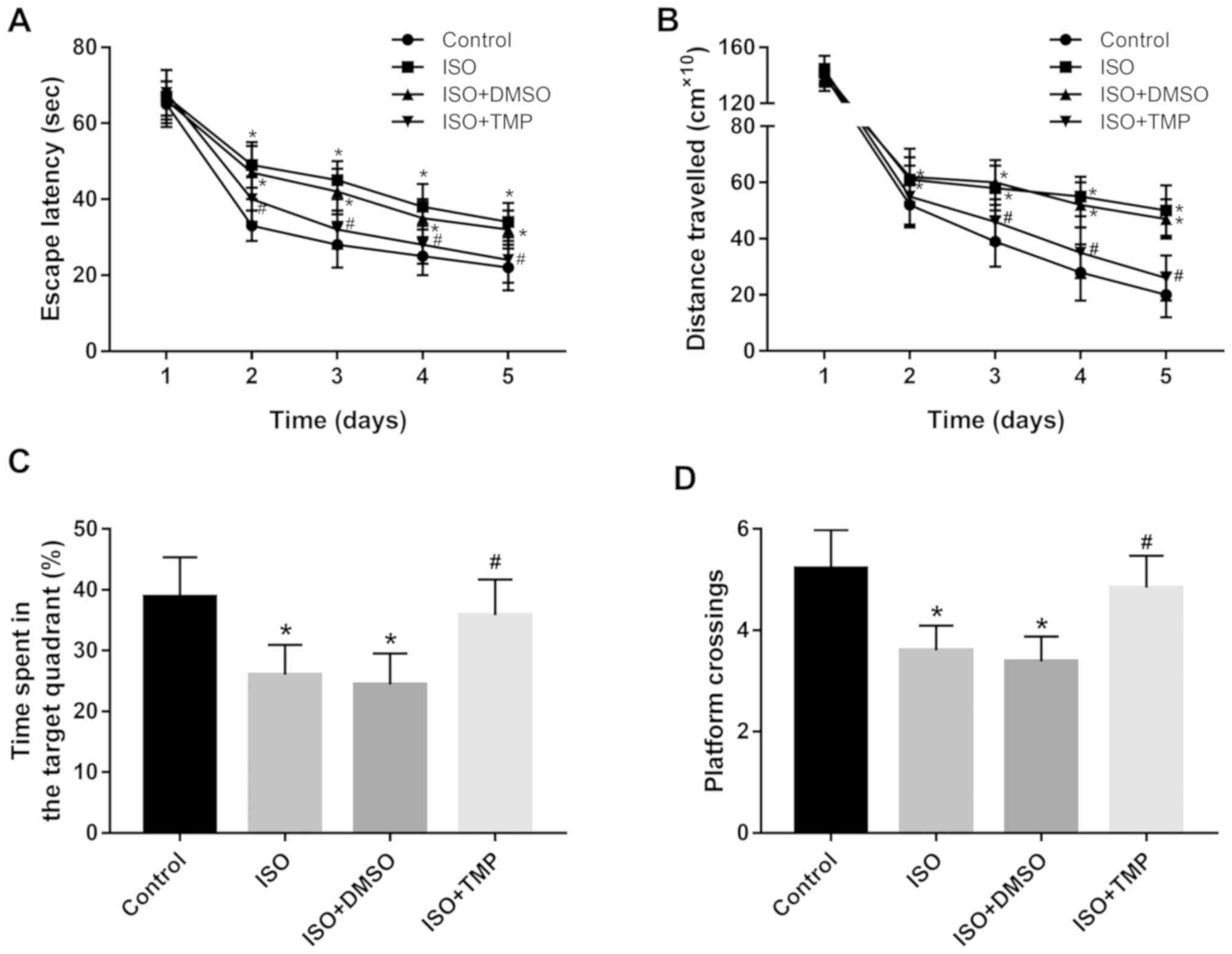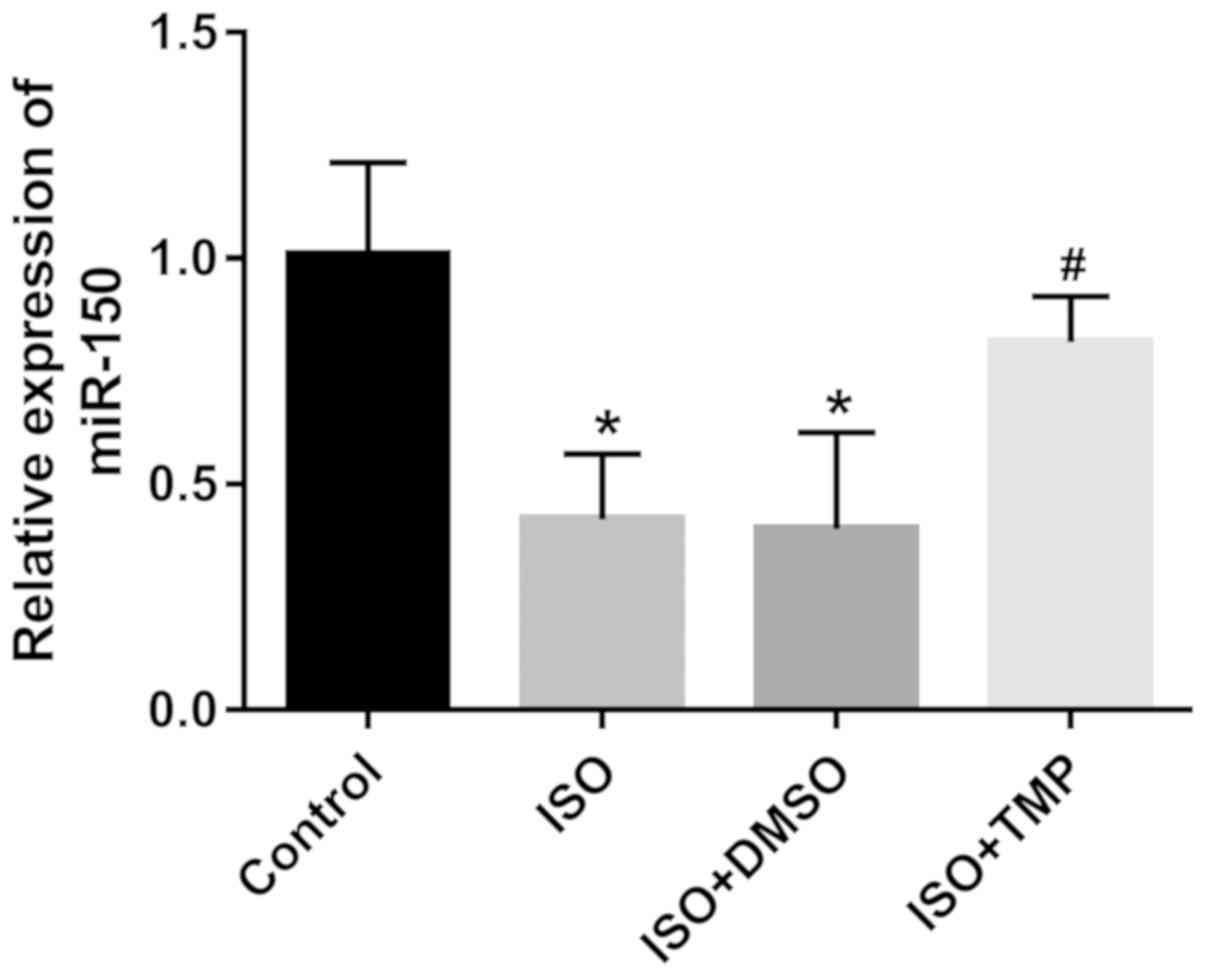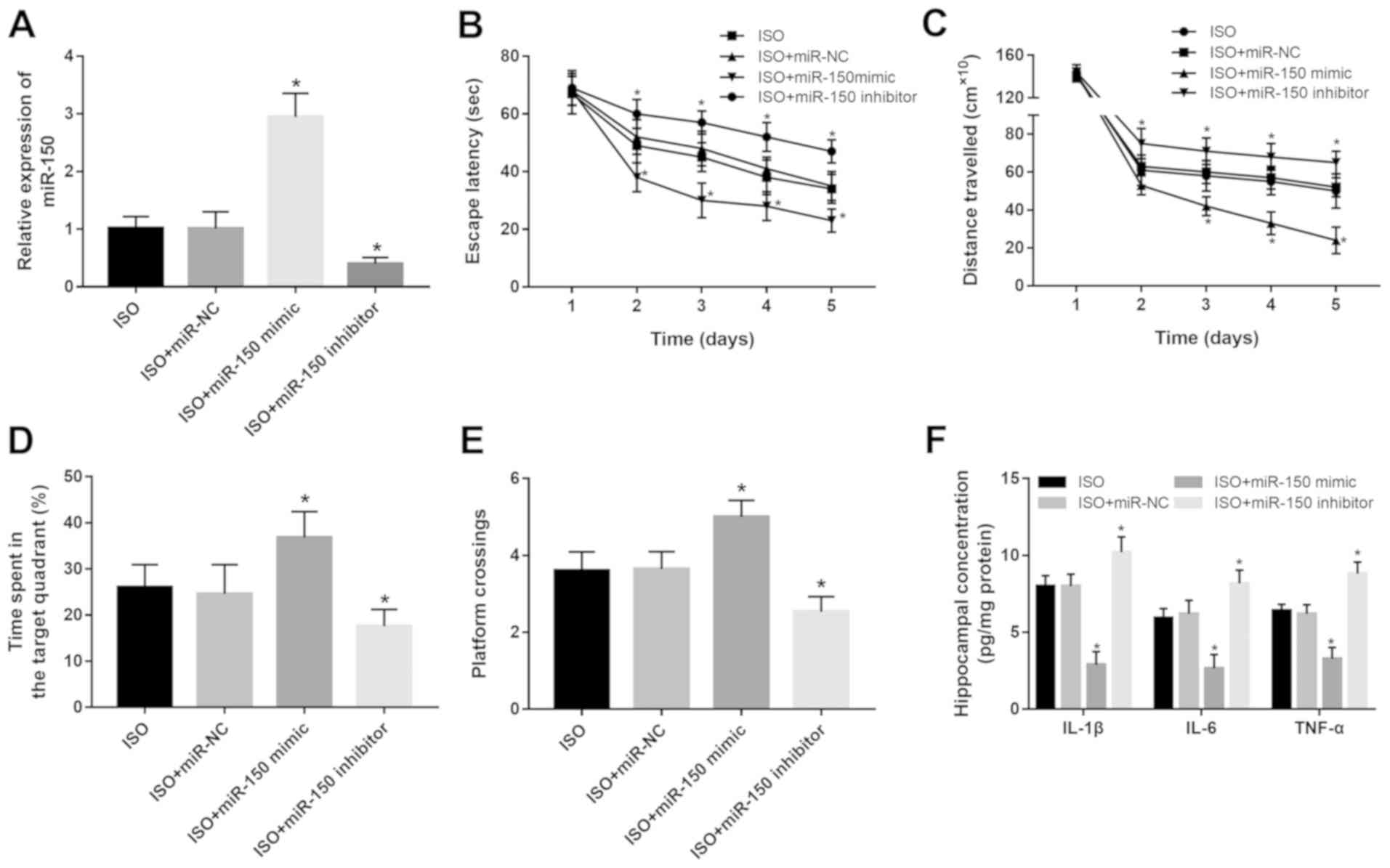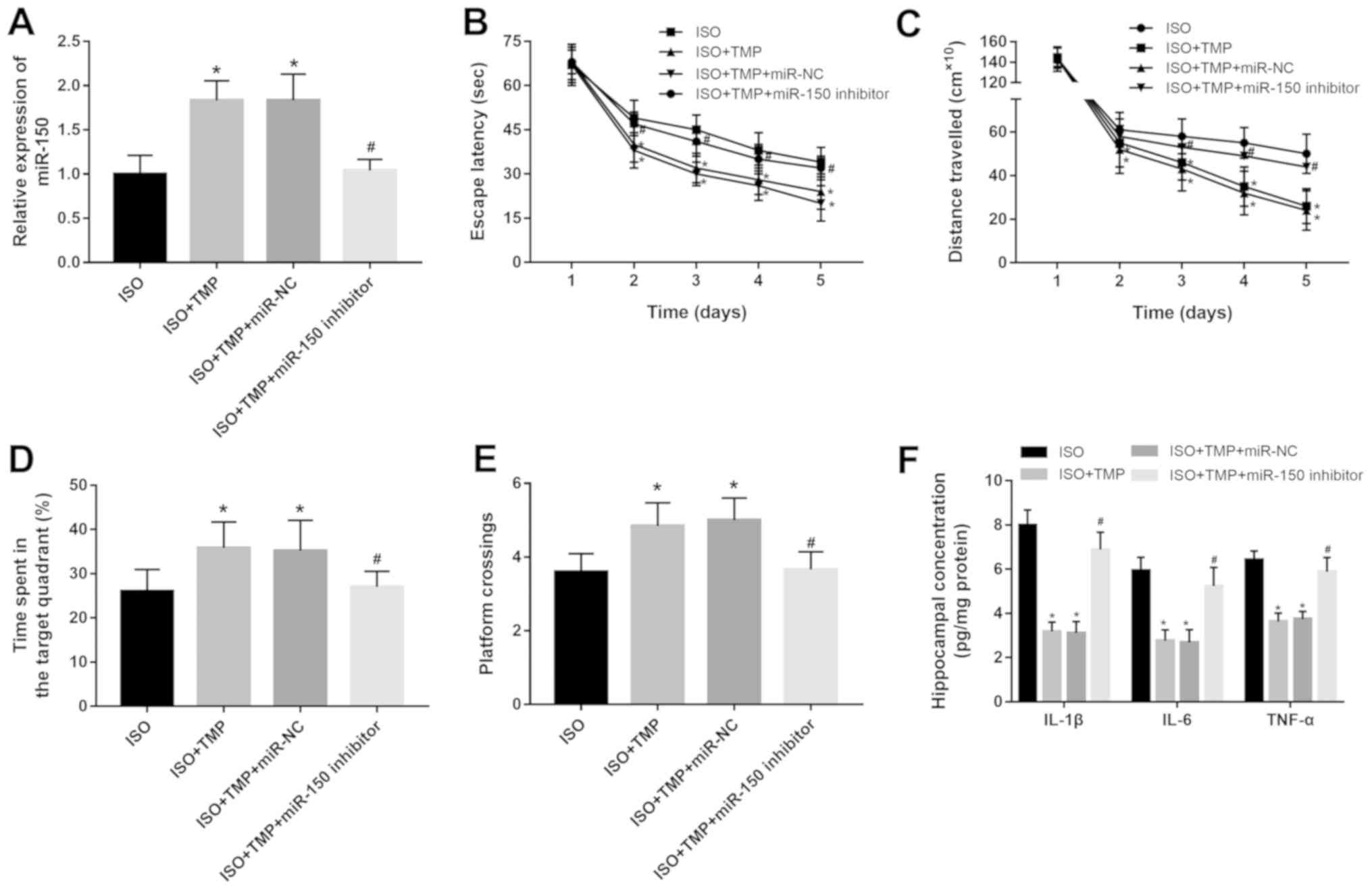|
1
|
Chen L, Xie W, Xie W, Zhuang W, Jiang C
and Liu N: Apigenin attenuates isoflurane-induced cognitive
dysfunction via epigenetic regulation and neuroinflammation in aged
rats. Arch Gerontol Geriatr. 73:29–36. 2017.PubMed/NCBI View Article : Google Scholar
|
|
2
|
Sha HY, Zhao JB, Sha MX and Guo SM:
Effects of vitamin B12 on postoperative cognitive dysfunction
induced by isoflurane anesthesia in rats. Eur Rev Med Pharmacol
Sci. 21:1959–1966. 2017.PubMed/NCBI
|
|
3
|
Bartels K, Li YJ, Li YW, White WD,
Laskowitz DT, Kertai MD, Stafford-Smith M, Podgoreanu MV, Newman MF
and Mathew JP: Apolipoprotein epsilon 4 genotype is associated with
less improvement in cognitive function five years after cardiac
surgery: A retrospective cohort study. Can J Anaesth. 62:618–626.
2015.PubMed/NCBI View Article : Google Scholar
|
|
4
|
Song J, Chu S, Cui Y, Qian Y, Li X, Xu F,
Shao X, Ma Z, Xia T and Gu X: Circadian rhythm resynchronization
improved isoflurane-induced cognitive dysfunction in aged mice. Exp
Neurol. 306:45–54. 2018.PubMed/NCBI View Article : Google Scholar
|
|
5
|
Guo M, Zhu X, Xu H, Li J, Yang S, Zuo Z
and Lin D: Ulinastatin attenuates isoflurane-induced cognitive
dysfunction in aged rats by inhibiting neuroinflammation and
β-amyloid peptide expression in the brain. Neurol Res. 41:1–7.
2019.PubMed/NCBI View Article : Google Scholar
|
|
6
|
Callaway JK, Wood C, Jenkins TA, Royse AG
and Royse CF: Isoflurane in the presence or absence of surgery
increases hippocampal cytokines associated with memory deficits and
responses to brain injury in rats. Behav Brain Res. 303:44–52.
2016.PubMed/NCBI View Article : Google Scholar
|
|
7
|
Wang W, Chen X, Zhang J, Zhao Y, Li S, Tan
L, Gao J, Fang X and Luo A: Glycyrrhizin attenuates
isoflurane-induced cognitive deficits in neonatal rats via its
anti-inflammatory activity. Neuroscience. 316:328–336.
2016.PubMed/NCBI View Article : Google Scholar
|
|
8
|
Shao Z, Wang L, Liu S and Wang X:
Tetramethylpyrazine protects neurons from oxygen-glucose
deprivation-induced death. Med Sci Monit. 23:5277–5282.
2017.PubMed/NCBI View Article : Google Scholar
|
|
9
|
Liu Y, Li X, Jiang S and Ge Q:
Tetramethylpyrazine protects against high glucose-induced vascular
smooth muscle cell injury through inhibiting the phosphorylation of
JNK, p38MAPK, and ERK. J Int Med Res. 46:3318–3326. 2018.PubMed/NCBI View Article : Google Scholar
|
|
10
|
Shao Z, Wu P, Wang X, Jin M, Liu S, Ma X
and Shi H: Tetramethylpyrazine protects against early brain injury
and inhibits the PERK/Akt pathway in a rat model of subarachnoid
hemorrhage. Neurochem Res. 43:1650–1659. 2018.PubMed/NCBI View Article : Google Scholar
|
|
11
|
Michel HE, Tadros MG, Esmat A, Khalifa AE
and Abdel-Tawab AM: Tetramethylpyrazine ameliorates
rotenone-induced Parkinson's disease in rats: Involvement of its
anti-inflammatory and anti-apoptotic actions. Mol Neurobiol.
54:4866–4878. 2017.PubMed/NCBI View Article : Google Scholar
|
|
12
|
Xu SH, Yin MS, Liu B, Chen ML, He GW, Zhou
PP, Cui YJ, Yang D and Wu YL: Tetramethylpyrazine-2'-O-sodium
ferulate attenuates blood-brain barrier disruption and brain oedema
after cerebral ischemia/reperfusion. Hum Exp Toxicol. 36:670–680.
2017.PubMed/NCBI View Article : Google Scholar
|
|
13
|
Fu S, Wang J, Hao C, Dang H and Jiang S:
Tetramethylpyrazine ameliorates depression by inhibiting TLR4-NLRP3
inflammasome signal pathway in mice. Psychopharmacology (Berl).
236:2173–2185. 2019.PubMed/NCBI View Article : Google Scholar
|
|
14
|
Wang Z, Wang Q, Wang C, Xu X and Yu H:
Tetramethylpyrazine attenuates periorbital allodynia and
neuroinflammation in a model of traumatic brain injury. J Inflamm
(Lond). 14(13)2017.PubMed/NCBI View Article : Google Scholar
|
|
15
|
Vienberg S, Geiger J, Madsen S and
Dalgaard LT: MicroRNAs in metabolism. Acta Physiol (Oxf).
219:346–361. 2017.PubMed/NCBI View Article : Google Scholar
|
|
16
|
Rodrigues DC, Kim DS, Yang G, Zaslavsky K,
Ha KC, Mok RS, Ross PJ, Zhao M, Piekna A, Wei W, et al: MECP2 is
post-transcriptionally regulated during human neurodevelopment by
combinatorial action of RNA-binding proteins and miRNAs. Cell Rep.
17:720–734. 2016.PubMed/NCBI View Article : Google Scholar
|
|
17
|
Gaudet AD, Fonken LK, Watkins LR, Nelson
RJ and Popovich PG: MicroRNAs: Roles in regulating
neuroinflammation. Neuroscientist. 24:221–245. 2018.PubMed/NCBI View Article : Google Scholar
|
|
18
|
Ji LJ, Shi J, Lu JM and Huang QM: MiR-150
alleviates neuropathic pain via inhibiting toll-like receptor 5. J
Cell Biochem. 119:1017–1026. 2018.PubMed/NCBI View Article : Google Scholar
|
|
19
|
Cai W, Zhang Y, Liu Y, Liu H, Zhang Z and
Su Z: Effects of miR-150 on neuropathic pain process via targeting
AKT3. Biochem Biophys Res Commun. 517:532–537. 2019.PubMed/NCBI View Article : Google Scholar
|
|
20
|
Wang J, Masika J, Zhou J, Wang J, Zhu M,
Luo H, Hu X, Zhang L, Tang M, Gao L, et al: Traditional Chinese
medicine baicalin suppresses mESCs proliferation through inhibition
of miR-294 expression. Cell Physiol Biochem. 35:1868–1876.
2015.PubMed/NCBI View Article : Google Scholar
|
|
21
|
Newcomer CE: The evolution and adoption of
standards used by AAALAC. J Am Assoc Lab Anim Sci. 51:293–297.
2012.PubMed/NCBI
|
|
22
|
Chang CY, Kao TK, Chen WY, Ou YC, Li JR,
Liao SL, Raung SL and Chen CJ: Tetramethylpyrazine inhibits
neutrophil activation following permanent cerebral ischemia in
rats. Biochem Biophys Res Commun. 463:421–427. 2015.PubMed/NCBI View Article : Google Scholar
|
|
23
|
Shi C, Yi D, Li Z, Zhou Y, Cao Y, Sun Y,
Chui D and Guo X: Anti-RAGE antibody attenuates isoflurane-induced
cognitive dysfunction in aged rats. Behav Brain Res. 322:167–176.
2017.PubMed/NCBI View Article : Google Scholar
|
|
24
|
Livak KJ and Schmittgen TD: Analysis of
relative gene expression data using real-time quantitative PCR and
the 2(-Delta Delta C(T)) method. Methods. 25:402–408.
2001.PubMed/NCBI View Article : Google Scholar
|
|
25
|
Shan L, Ma D, Zhang C, Xiong W and Zhang
Y: miRNAs may regulate GABAergic transmission associated genes in
aged rats with anesthetics-induced recognition and working memory
dysfunction. Brain Res. 1670:191–200. 2017.PubMed/NCBI View Article : Google Scholar
|
|
26
|
Li FS and Weng JK: Demystifying
traditional herbal medicine with modern approach. Nat plants.
3(17109)2017.PubMed/NCBI View Article : Google Scholar
|
|
27
|
Zhang Y, Zhang Z, Wang H, Cai N, Zhou S,
Zhao Y, Chen X, Zheng S, Si Q and Zhang W: Neuroprotective effect
of ginsenoside Rg1 prevents cognitive impairment induced by
isoflurane anesthesia in aged rats via antioxidant,
anti-inflammatory and anti-apoptotic effects mediated by the
PI3K/AKT/GSK-3beta pathway. Mol Med Rep. 14:2778–2784.
2016.PubMed/NCBI View Article : Google Scholar
|
|
28
|
Chen L, Zhang B, Shan S and Zhao X:
Neuroprotective effects of vitexin against isoflurane-induced
neurotoxicity by targeting the TRPV1 and NR2B signaling pathways.
Mol Med Rep. 14:5607–5613. 2016.PubMed/NCBI View Article : Google Scholar
|
|
29
|
Liang L, Ma Z, Dong M, Ma J, Jiang A and
Sun X: Protective effects of salidroside against isoflurane-induced
cognitive impairment in rats. Hum Exp Toxicol. 36:1295–1302.
2017.PubMed/NCBI View Article : Google Scholar
|
|
30
|
Zhao S, Zhang Z, Yao Z, Shao J, Chen A,
Zhang F and Zheng S: Tetramethylpyrazine attenuates sinusoidal
angiogenesis via inhibition of hedgehog signaling in liver
fibrosis. IUBMB life. 69:115–127. 2017.PubMed/NCBI View Article : Google Scholar
|
|
31
|
Zhou Y, Ji Z, Yan W, Zhou Z, Li H and Xiao
Y: Tetramethylpyrazine inhibits prostate cancer progression by
downregulation of forkhead box M1. Oncol Rep. 38:837–842.
2017.PubMed/NCBI View Article : Google Scholar
|
|
32
|
Zhang G, Zhang T, Li N, Wu L, Gu J, Li C,
Zhao C, Liu W, Shan L, Yu P, et al: Tetramethylpyrazine nitrone
activates the BDNF/Akt/CREB pathway to promote post-ischaemic
neuroregeneration and recovery of neurological functions in rats.
Br J Pharmacol. 175:517–531. 2018.PubMed/NCBI View Article : Google Scholar
|
|
33
|
Zheng B, Lai R, Li J and Zuo Z: Critical
role of P2X7 receptors in the neuroinflammation and cognitive
dysfunction after surgery. Brain Behav Immun. 61:365–374.
2017.PubMed/NCBI View Article : Google Scholar
|
|
34
|
Miao HH, Zhang Y, Ding GN, Hong FX, Dong P
and Tian M: Ginsenoside Rb1 attenuates isoflurane/surgery-induced
cognitive dysfunction via inhibiting neuroinflammation and
oxidative stress. Biomed Environ Sci. 30:363–372. 2017.PubMed/NCBI View Article : Google Scholar
|
|
35
|
Chen L, Liu T, Wang Q and Liu J:
Anti-inflammatory effect of combined tetramethylpyrazine,
resveratrol and curcumin in vivo. BMC Complement Altern Med.
17(233)2017.PubMed/NCBI View Article : Google Scholar
|
|
36
|
Sorrenti V, Giusti P and Zusso M: A model
of systemic inflammation to study neuroinflammation. Methods Mol
Biol. 1727:361–372. 2018.PubMed/NCBI View Article : Google Scholar
|
|
37
|
Liu J, Li M, Wang Y and Luo J: Curcumin
sensitizes prostate cancer cells to radiation partly via epigenetic
activation of miR-143 and miR-143 mediated autophagy inhibition. J
Drug Target. 25:645–652. 2017.PubMed/NCBI View Article : Google Scholar
|
|
38
|
Fan L, Zhang H, Li X, Yang G, Ru J and Liu
T: Emodin protects hyperglycemia-induced injury in PC-12cells by
up-regulation of miR-9. Mol Cell Endocrinol. 474:194–200.
2018.PubMed/NCBI View Article : Google Scholar
|
|
39
|
Fan Y and Wu Y: Tetramethylpyrazine
alleviates neural apoptosis in injured spinal cord via the
downregulation of miR-214-3p. Biomed Pharmacother. 94:827–833.
2017.PubMed/NCBI View Article : Google Scholar
|
|
40
|
Zhang X, Dong H, Liu Y, Han J, Tang S and
Si J: Tetramethylpyrazine partially relieves hypoxia-caused damage
of cardiomyocytes H9c2 by downregulation of miR-449a. J Cell
Physiol: Feb 15, 2019 (Epub ahead of print). doi:
10.1002/jcp.28151.
|
|
41
|
Dolati S, Aghebati-Maleki L, Ahmadi M,
Marofi F, Babaloo Z, Ayramloo H, Jafarisavari Z, Oskouei H, Afkham
A, Younesi V, et al: Nanocurcumin restores aberrant miRNA
expression profile in multiple sclerosis, randomized, double-blind,
placebo-controlled trial. J Cell Physiol. 233:5222–5230.
2018.PubMed/NCBI View Article : Google Scholar
|
|
42
|
Chen X, Li Z, Xu D and Li S: LINC01121
induced intervertebral disc degeneration via modulating
miR-150-5p/MMP16 axis. J Gene Med: May 21, 2020 (Epub ahead of
print). doi: 10.1002/jgm.3231.
|
|
43
|
Zhang T, Shi Z, Wang Y, Wang L, Zhang B,
Chen G, Wan Q and Chen L: Akt3 deletion in mice impairs spatial
cognition and hippocampal CA1 long long-term potentiation through
downregulation of mTOR. Acta Physiol (Oxf).
225(e13167)2019.PubMed/NCBI View Article : Google Scholar
|
|
44
|
Howell KR, Floyd K and Law AJ:
PKBgamma/AKT3 loss-of-function causes learning and memory deficits
and deregulation of AKT/mTORC2 signaling: Relevance for
schizophrenia. PLoS One. 12(e0175993)2017.PubMed/NCBI View Article : Google Scholar
|
|
45
|
DuBois JC, Ray AK, Gruber RC, Zhang Y,
Aflakpui R, Macian-Juan F and Shafit-Zagardo B: Akt3-mediated
protection against inflammatory demyelinating disease. Front
Immunol. 10(1738)2019.PubMed/NCBI View Article : Google Scholar
|
|
46
|
Tang G, Yang H, Chen J, Shi M, Ge L, Ge X
and Zhu G: Metformin ameliorates sepsis-induced brain injury by
inhibiting apoptosis, oxidative stress and neuroinflammation via
the PI3K/Akt signaling pathway. Oncotarget. 8:97977–97989.
2017.PubMed/NCBI View Article : Google Scholar
|
|
47
|
Yang Q, Huang DD, Li DG, Chen B, Zhang LM,
Yuan CL and Huang HH: Tetramethylpyrazine exerts a protective
effect against injury from acute myocardial ischemia by regulating
the PI3K/Akt/GSK-3beta signaling pathway. Cell Mol Biol Lett.
24(17)2019.PubMed/NCBI View Article : Google Scholar
|
|
48
|
Fan H, Liu X, Zheng WW, Zhuang ZH and Wang
CD: MiR-150 alleviates EMT and cell invasion of colorectal cancer
through targeting Gli1. Eur Rev Med Pharmacol Sci. 21:4853–4859.
2017.PubMed/NCBI
|
|
49
|
Li Y, Su J, Li F, Chen X and Zhang G:
MiR-150 regulates human keratinocyte proliferation in hypoxic
conditions through targeting HIF-1alpha and VEGFA: Implications for
psoriasis treatment. PLoS One. 12(e0175459)2017.PubMed/NCBI View Article : Google Scholar
|
|
50
|
Peng L, Yang C, Yin J, Ge M, Wang S, Zhang
G, Zhang Q, Xu F, Dai Z, Xie L, et al: TGF-β2 induces Gli1 in a
Smad3-dependent manner against cerebral ischemia/reperfusion injury
after isoflurane post-conditioning in rats. Front Neurosci.
13(636)2019.PubMed/NCBI View Article : Google Scholar
|
|
51
|
Cao Y, Li Z, Li H, Ni C, Li L, Yang N, Shi
C, Zhong Y, Cui D and Guo X: Hypoxia-inducible factor-1alpha is
involved in isoflurane-induced blood-brain barrier disruption in
aged rats model of POCD. Behav Brain Res. 339:39–46.
2018.PubMed/NCBI View Article : Google Scholar
|
|
52
|
Mehmood K, Zhang H, Li K, Wang L, Rehman
MU, Nabi F, Iqbal MK, Luo H, Shahzad M and Li J: Effect of
tetramethylpyrazine on tibial dyschondroplasia incidence, tibial
angiogenesis, performance and characteristics via HIF-1alpha/VEGF
signaling pathway in chickens. Sci Rep. 8(2495)2018.PubMed/NCBI View Article : Google Scholar
|
|
53
|
Yang C, Xu Y, Zhou H, Yang L, Yu S, Gao Y,
Huang Y, Lu L and Liang X: Tetramethylpyrazine protects
CoCl2-induced apoptosis in human umbilical vein endothelial cells
by regulating the PHD2/HIF/1α-VEGF pathway. Mol Med Rep.
13:1287–1296. 2016.PubMed/NCBI View Article : Google Scholar
|




















